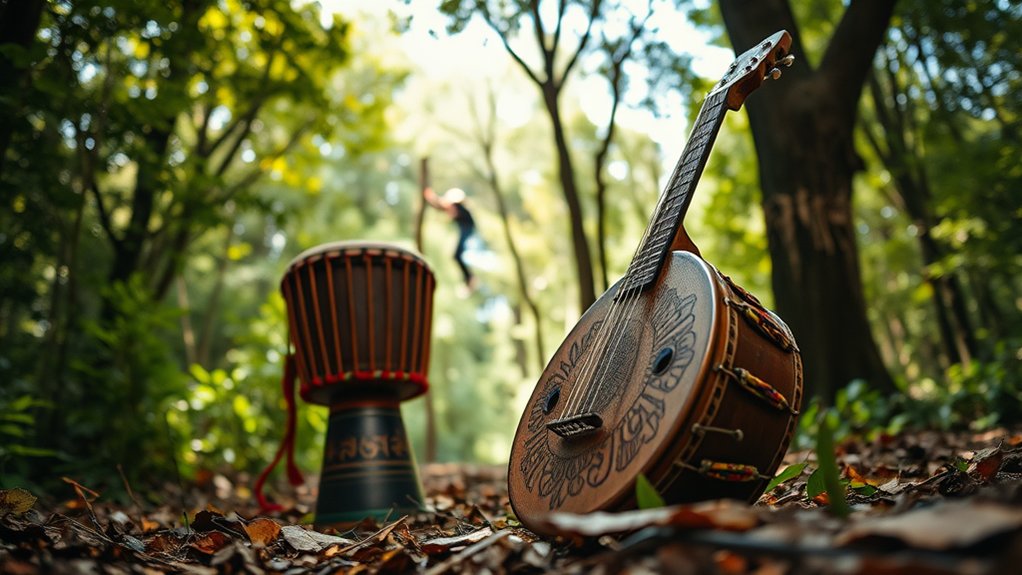Key Takeaways:
- The African influence in American music is profound and often overlooked, with instruments like the banjo tracing back to African origins, such as the akonting.
- Spirituals served as more than just songs during challenging times; they acted as secret codes symbolizing freedom and hope.
- This heritage is not merely about rhythm and notes but represents the heartbeat of American culture.
Unveiling the Origins of American Music
When folks talk about the "American dream," they often skip over the vibrant music that echoes our shared journey. Many have no clue just how deep African roots run in American music history.
Did you know the banjo has an African ancestor called the akonting? Or that spirituals born in times of hardship were like secret codes for freedom and hope?
This rich legacy isn't just rhythm and notes—it's the heartbeat of American culture. Curious about the untold story?
African Instruments in the Foundation of American Music
Did you know that many musical instruments we consider uniquely American actually trace back to Africa? African lutes, like the akonting, are the ancestors of American banjos, echoing a profound cultural fusion. When you hear the rhythmic patterns strummed on a modern banjo, you're experiencing a melody shaped by African innovation and American spirit. Across the musical scenery, this exchange weaves a rich tapestry, illustrating how African instruments laid the foundation for American music. Rhythmic patterns from tribal traditions became integral to the beat of genres like blues and jazz. The distinctive features of African American music, such as blue notes and call-and-response, essential in the evolution of these genres, originate from Africa. As you explore the sounds that entertain and uplift us, remember the African roots that infuse each note with history and heritage, enhancing our shared cultural identity.
Hidden Messages and Emotional Expression Through Slavery
The notes played by African instruments laid the groundwork for American music; now let's explore how the stories they tell carried profound messages during slavery. Spiritual expressions hid concealed instructions like paths to freedom, showing cultural resilience. Songs like "Follow the Drinking Gourd" acted as map songs, guiding the enslaved by stars. Through code words, spirituals informed escape plans; biblical allusions expressed liberation hopes.
Amidst secrecy, these songs provided solace, strengthening emotional bonds in harsh times and creating community. Daily singing eased oppression, preserving transgenerational traditions of innovation and resistance. African rhythms kept alive in spirituals promoted communication when words were silent. These rich musical tapestries signaled hidden meanings, encouraging freedom paths supported by abolitionists while shaping American music's legacy. Drawing on these musical traditions is akin to exploring a rich dimension of spiritual guidance, where cultural influences blend traditional and new-age spiritual practices.
Evolution of African-American Music Genres
When you think about the evolution of African-American music genres, you might start to trace its roots to vibrant African rhythms brought over during the slave trade. This rhythmic foundation laid the groundwork for the blues evolution, emerging from spirituals and work songs and echoing themes of resilience.
Jazz improvisation sprung from New Orleans, fusing blues, African rhythms, and European influences. This musical dialogue brought a new dynamic to American music.
| Genre | Origin | Key Element |
|---|---|---|
| Blues | Deep South | Emotion & storytelling |
| Jazz | New Orleans | Improvisation |
| R&B | Urban centers | Fusion of styles |
| Hip-Hop | New York City | Rhythmic speech |
As African Americans migrated, R&B and soul came to life, reflecting social change and empowering future generations.
The Global Legacy of African-American Musical Influence
Although much of today's music bumping through your headphones traces its roots back to African-American innovators, you mightn't always stop to think about its profound global impact.
African-American music genres like jazz, blues, and rhythm and blues have influenced international music scenes markedly. Artists worldwide vibe to African-derived elements like blue notes and call-and-response, infusing their local traditions.
Global collaborations thrive, connecting artists across continents through cultural exchange and shared musical heritage. The African diaspora's influence, such as Afro-Cuban rhythms in Latin jazz, enriches this global dialogue.
Educational efforts highlight these rich contributions, making them accessible and engaging. As you tune into your favorite beats, remember the worldwide legacy of African-American music shaping today's vibrant cultural terrain. Urban culture continuously evolves and reclaims its power, showcasing the resilience and innovation deeply embedded in African-American musical history.
Conclusion
Unveiling the Tapestry of American Music
So, how amazing is it to realize that African influences are the unsung heroes of American music? Like a vibrant tapestry, these roots weave a story of resilience and creativity. Next time you groove to blues or jazz, take a moment to appreciate being part of a continuous melody that celebrates courage and culture. Understanding this history not only tunes your ear to the past but also sets the stage for future rhythms. Let's keep this beat alive by sharing it with future generations!










